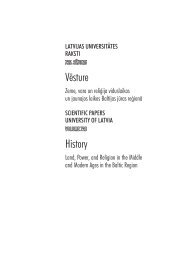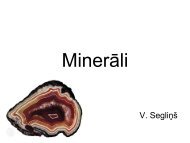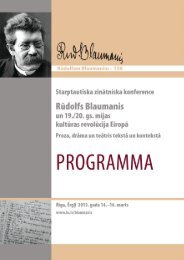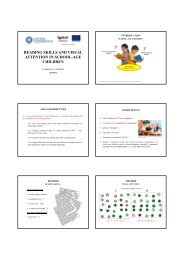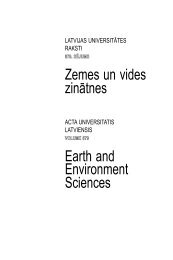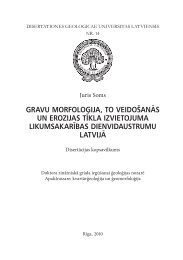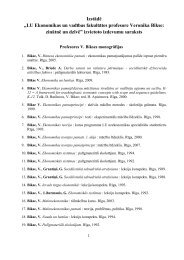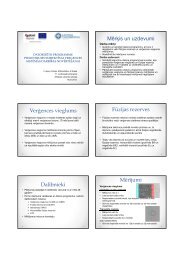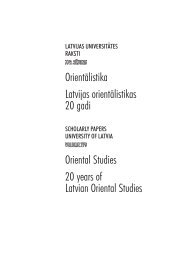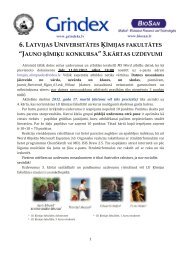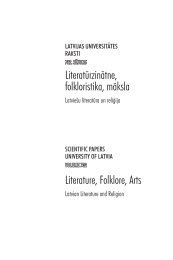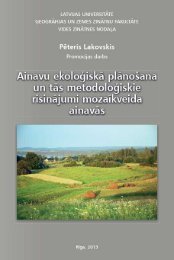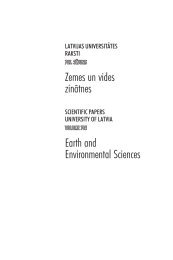Latgalistikys kongresu materiali, III. 2011. - Latvijas Universitāte
Latgalistikys kongresu materiali, III. 2011. - Latvijas Universitāte
Latgalistikys kongresu materiali, III. 2011. - Latvijas Universitāte
You also want an ePaper? Increase the reach of your titles
YUMPU automatically turns print PDFs into web optimized ePapers that Google loves.
of subjectivity, resolving the risk of psychosis in narrative experience) on<br />
the other (ibid.: 193).<br />
The poetic mode of narration in “Valerian’s Life and Views” brings<br />
out a number of instances of anxiety and gratification. One of them is the<br />
motif of death that recurs in the narration both as an object of philosophical<br />
reflection and an ultimate limit of language and subjectivity, fearful<br />
and desirable, poeticized through melancholic and feminine metaphors.<br />
For instance, the narrator states that the novel is actually dedicated to the<br />
priest who hanged himself having written a couplet shortly before committing<br />
suicide:<br />
ŠUDIŅ GRYBU PASACEIT VYSU I VĪNKUORŠIM VUORDIM —<br />
NUOVE IR SĪVĪTE SKUMEIGU SMAIDU I SAULAINĀ PARUDIŅ<br />
VIEJĀ. 56 (Seiksts, Lukaševičs 1996: 9)<br />
The tramp met by the narrators shares his experience of having suddenly<br />
realized that he should stop running away from death along the<br />
moonlit road as she already surrounds him amid her banks and supermarkets,<br />
and meeting her among familiar things is what he actually desires<br />
(Seiksts, Lukaševičs 1996: 43–44). Narrators’ reflections of fragmentation<br />
and diverse states of transformation also point to death as the ultimate limit<br />
of subjectivity, the point of fusion and re-emergence. It generally seems<br />
that the whole narration actually maps out the search for the ways of transcendence,<br />
going beyond the limits of reality, and the two major routes<br />
followed are those of transcending identities and the established modes of<br />
reasoning.<br />
The major instance of gratification in the novel is channeled via celebrating<br />
the profusion (of forms of experience, transformation, transcendence)<br />
of the poetic vision available for the narrators and, for that matter,<br />
for the reader. In this sense “Valerian’s Life and Views” may be considered<br />
as a life-asserting novel with a healing effect.<br />
Self-referentiality<br />
Within the diffuse collective narration, a self-referential authorial<br />
voice may be discerned that provides comments on the novel, starting from<br />
the very first page: the motto is followed by an authorial commentary on<br />
the beginning of the novel:<br />
56 ‘today I wish to say all and in simple words — / death is a woman with a wistful<br />
smile and in sunny autumn wind.’<br />
171



